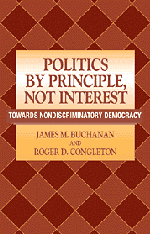Book contents
- Frontmatter
- Contents
- List of figures and tables
- Preface
- Acknowledgements
- PART ONE INTRODUCTION
- PART TWO ANALYSIS
- PART THREE APPLICATION
- 6 Generality and externality
- 7 Market restriction and the generality norm
- 8 The political efficiency of general taxation
- 9 Deficit financing and intertemporal discrimination
- 10 Generality and the supply of public services
- 11 Generality and redistribution
- 12 Generality without uniformity: Social insurance
- 13 Generality without uniformity: Federalism
- PART FOUR PROSPECT
- Endnotes
- References
- Index
8 - The political efficiency of general taxation
Published online by Cambridge University Press: 27 March 2010
- Frontmatter
- Contents
- List of figures and tables
- Preface
- Acknowledgements
- PART ONE INTRODUCTION
- PART TWO ANALYSIS
- PART THREE APPLICATION
- 6 Generality and externality
- 7 Market restriction and the generality norm
- 8 The political efficiency of general taxation
- 9 Deficit financing and intertemporal discrimination
- 10 Generality and the supply of public services
- 11 Generality and redistribution
- 12 Generality without uniformity: Social insurance
- 13 Generality without uniformity: Federalism
- PART FOUR PROSPECT
- Endnotes
- References
- Index
Summary
This chapter concentrates on the politics of taxation. The interdependence between the workings of majoritarian democracy, as it is observed to operate in the United States in the 1990s, and the distribution of tax shares among persons and groups becomes our focal point of attention. The emergent results of this interdependence are, of course, affected by the constraints of the effective constitution – the rules of politics – as these are interpreted and enforced. And it is necessary to emphasize that the effective fiscal constitution, as it exists, does embody constraints that prevent many arbitrary departures from generality in tax treatment among persons and groups. It is widely acknowledged that the tax system, as observed in the United States near century's end, is less discriminatory than the expenditure system-the distribution of public spending benefits on the complementary side of the budget. That is to say, implementation of any generality norm may be closer to realization on the taxing side of the account. The question reduces to whether improvements can be made by moving toward further generality in treatment.
In a sense, our whole normative enterprise consists in constitutional evaluation, criticism, and suggestions for basic reforms. We ask, and try to answer, the question of whether changes in constitutional constraints on the taxing authority of governments, and notably those implied by moving toward implementation of the generality norm, can be expected to generate a more desirable pattern of outcomes. We suggest that movements toward generality in taxation will be “efficient,” even if attainment of some ideal remains far from reach.
- Type
- Chapter
- Information
- Politics by Principle, Not InterestTowards Nondiscriminatory Democracy, pp. 85 - 96Publisher: Cambridge University PressPrint publication year: 1998
- 1
- Cited by



